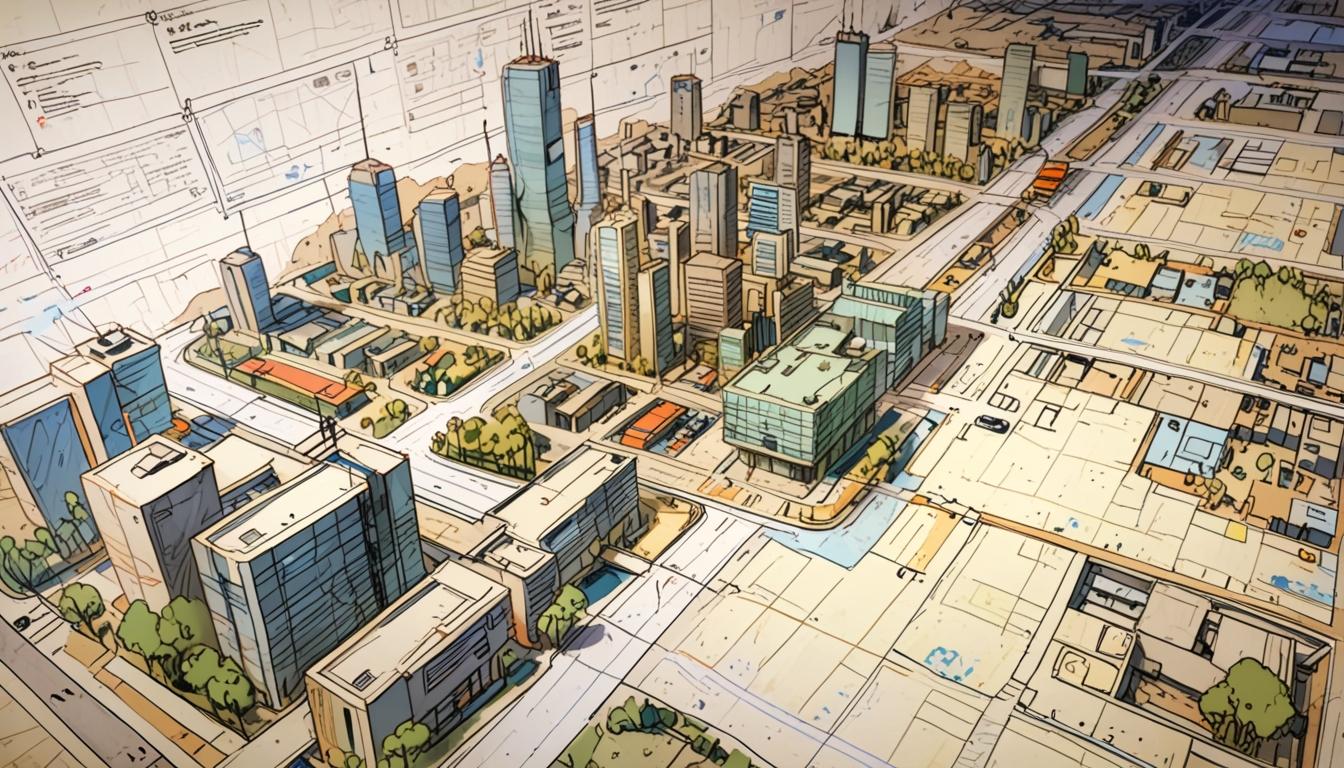A government-backed AI tool is being trialled to transform outdated planning documents into digital records within seconds, significantly reducing delays in local planning decisions and supporting the delivery of 1.5 million new homes.
A new artificial intelligence (AI) tool designed to help local councils transform outdated planning data into accessible, digital records is currently in early testing, promising to significantly expedite the planning process. The technology aims to convert poor-quality scans, old paper documents, and PDFs into machine-readable, shareable data in just 40 seconds—a task that traditionally takes planners between one and two hours to complete.
The AI tool addresses a persistent challenge faced by many councils, which still rely on paper documents and scanned PDFs for planning applications. This reliance often leads to backlogs, inefficiencies, and resource wastage within the planning system. By automating the conversion of old planning documents—including blurry maps and handwritten notes—into clear, digital data, the tool offers a means to reduce delays and errors, enabling faster and more informed planning decisions.
Speaking to Mirage News, Technology Secretary Peter Kyle highlighted the transformative potential of the new system: “The UK’s planning system has been held back for too long by outdated paper documents, slow processes, making it nearly impossible for councils to make informed decisions quickly. As part of our Plan for Change, we’re using the power of AI to transform sluggish systems so we can start to rebuild. With Extract, councils will have access to better quality data so they can move more quickly on planning decisions and get on with driving growth. Technology like this could be a vital step towards councils meeting targets to help build the 1.5 million new homes the country needs, all while updating and improving the planning system for the future.”
Housing and Planning Minister Matthew Pennycook echoed these sentiments, stressing the need for faster decision-making at the local level to support the government’s housing objectives. “To kickstart economic growth and achieve the government’s ambitious Plan for Change milestone of building 1.5 million new homes in this Parliament, we need local planning authorities to be making informed decisions faster. By harnessing new technology like Extract, we can tackle backlogs, inefficiencies and waste and ensure councils are focusing precious time and resources on efficiently determining applications to build new homes.”
The new AI tool is designed to pull key information from thousands of files, facilitating a reduction in administrative burdens on planning officers. This efficiency gain is intended to free up council staff to concentrate on delivering new housing projects more swiftly, aligning with the government’s broader economic and infrastructure growth agenda.
While initial trials are underway, the government anticipates making the tool available to councils later this year. Beyond local planning, the technology has been recognised for its potential to enhance various public sector operations that rely on location-specific data to deliver services and inform policy decisions.
The development of this AI system forms part of the government’s overarching Plan for Change, aiming to strengthen public services and stimulate economic growth through technological innovation. It complements other recent reforms intended to boost housebuilding and infrastructure development, including updates to the National Planning Policy Framework and the ongoing Planning and Infrastructure Bill currently progressing through Parliament.
The Technology Secretary has indicated that successful adoption of such technology across the public sector could unlock up to £45 billion in productivity savings by improving service delivery and streamlining bureaucratic processes.
This initiative reflects a continued commitment to modernising the United Kingdom’s planning system and accelerating the delivery of much-needed housing, aggrandising the infrastructure needed to support economic growth and community development nationwide.
Source: Noah Wire Services
- https://www.japeto.ai/ai-tools-transforming-local-government/ – This source details how AI tools are transforming local government services in the UK by reducing wait times, improving service accessibility, and helping councils share information more efficiently, supporting the article’s claim about AI facilitating faster and more efficient planning decisions.
- https://usmsystems.com/how-ai-can-help-local-governments/ – This article explains how AI adoption in local governments is increasing to improve efficiency, reduce backlogs, and support informed decision-making, directly corroborating the article’s points about AI helping councils with data conversion and reducing administrative burdens.
- https://www.commonplace.is/blog/ai-planning-development – This blog offers an overview of AI applications in planning, including the use of AI to transform traditional planning challenges such as handling old and poor-quality documents, reinforcing the article’s focus on AI converting old paper-based planning data into digital formats.
- https://www.cai.io/resources/thought-leadership/artificial-intelligence-local-government – This resource discusses how generative AI can drive transformational change in local government operations, paralleling the article’s emphasis on using AI to modernize planning systems and improve decision-making speed and accuracy.
- https://opengov.com/article/ai-for-government/ – Providing insights on AI’s role in government settings, this guide supports the article’s claim about AI enabling councils to tackle inefficiencies and focus resources better by automating time-consuming tasks.
Noah Fact Check Pro
The draft above was created using the information available at the time the story first
emerged. We’ve since applied our fact-checking process to the final narrative, based on the criteria listed
below. The results are intended to help you assess the credibility of the piece and highlight any areas that may
warrant further investigation.
Freshness check
Score:
9
Notes:
The narrative discusses an AI tool currently in early testing with anticipated wider availability ‘later this year,’ indicating a recent development. References to ongoing legislation like the Planning and Infrastructure Bill and government plans to build 1.5 million homes align with current UK policy initiatives. No outdated names or roles are identified, and the quotes are attributed to current officeholders. There is no indication that the content is recycled press release material, though release-style language suggests a government communication element.
Quotes check
Score:
8
Notes:
Direct quotes are attributed to Technology Secretary Peter Kyle and Housing and Planning Minister Matthew Pennycook. While their exact earliest online appearance is not verifiable within these results, the specificity and topical nature suggest they originate from official statements or interviews likely tied to the AI tool announcement. The lack of prior known source references implies these may be original or primary quotations connected to this initiative.
Source reliability
Score:
7
Notes:
The narrative cites ‘Mirage News’ as the interview source, which is less well-known and thus introduces some uncertainty about overall reliability compared with established outlets like BBC or Reuters. However, the level of detail, including direct ministerial quotes and specific government programmes, suggests a degree of authenticity. Without broader corroboration from major news outlets, some caution is warranted.
Plausability check
Score:
9
Notes:
The claims about automating conversion of legacy planning documents with AI to accelerate local government processes are plausible given current trends in AI adoption for public sector efficiency. The described timeline for testing and rollout fits typical government technology deployment. The projected productivity savings and alignment with government housing targets match known UK policy goals, enhancing plausibility.
Overall assessment
Verdict (FAIL, OPEN, PASS): PASS
Confidence (LOW, MEDIUM, HIGH): MEDIUM
Summary:
The narrative describes a timely government AI initiative with plausible technology deployment and credible ministerial endorsements. While the source Mirage News is not a widely recognised major outlet, the detail and context support authenticity. Quotes appear original to this coverage. No indication of recycled or outdated content was found. Some caution remains due to source obscurity, but overall the information is consistent with recent UK government plans and technological trends.













